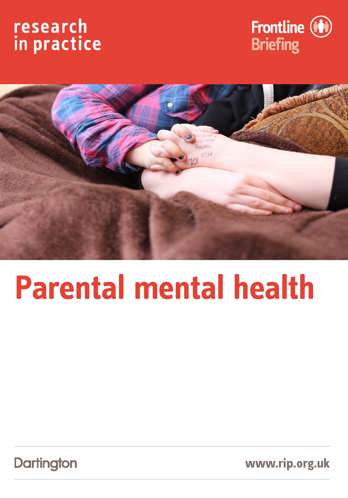Parental mental health: Frontline Tool (2018)
Introduction
Mental health problems are common:
-
Around one in four of the adult population will experience mental health problems at some point in their lives. A third of these will be parents at the time.
-
Parental mental health problems can have a negative impact on children's development but most parents who experience mental health problems do not neglect or harm their children.
However, when we analyse the factors involved in serious case reviews or in the removal of children into care, parental mental health problems are identified in a high proportion of cases. The risk of harm to a child increases where mental health problems are present alongside other pressures and problems and where there are fewer protective factors.
What do we mean by 'mental health problems'?
The term 'mental health problems' covers a wide range of issues which can be mild, moderate or severe, and may be persistent, recurrent or occur only once. This includes mood-related difficulties such as depression, anxiety, phobias, post-traumatic stress disorder, post-natal depression, eating disorders, or psychotic or personality difficulties.
Psychosocial factors increase the risk of developing mental health problems:
The risk of developing a mental health problem is greater for people who experience unfavourable social, economic or environmental factors, particularly when these are combined with problematic childhood or life experiences. Factors linked in research to mental health problems include:
- Unemployment, poverty and debt.
- Homelessness and poor housing.
- Domestic abuse.
- Experiencing physical or emotional abuse, or neglect or sexual abuse in childhood.
- Family conflict.
- Experiencing loss or bereavement as a child through death, parental separation or the imprisonment of a parent.
- Being a lone parent.
- Physical health problems or disability.
- Learning disability.
- Being a carer.
- Being a refugee or asylum seeker.
- Experiencing racism.
- Identifying as lesbian, gay, bisexual or transgender (LGBT).
These factors overlap with vulnerabilities which place children at risk of harm:
Identified in the latest analysis of serious case reviews, these factors appear to interact with each other, creating cumulative levels of risk the more factors are present:
- Domestic abuse.
- Substance misuse.
- Parents with adverse childhood experiences.
- A history of violent crime.
- Multiple sequential partners.
- Acrimonious separation.
- Social isolation.
- Transient lifestyle.
- Inappropriate housing.
The impact of parents' mental health problems on children's health and development will be different in each case. Analysis should consider:
- the type of mental health problem
- how long the problem has lasted for and whether it is recurrent
- the age at which the parent developed the problem
- the age of the child
- any treatment being received by the parent, or received in the past
- the history of the development of the mental health problems
- the way the mental health problems are affecting the parent's behaviour or interaction with the child
- whether the parent has insight into the impact of their problems on the child
- whether the mental health problem is compounded by other problems
- the presence or absence of protective factors within the child themselves, the family and/or the social environment.
Social workers and family support workers have an important role to play:
Key aspects are looking at ways to bolster protective factors and helping the family tackle other vulnerabilities/ risk factors. There is growing evidence for the benefits of:
- A systemic approach, looking not just at the parent's mental health problem but at the family systems and interactions and at the family's interactions with services.
- Multi-disciplinary teams involving practitioners from adult services such as mental health and substance misuse.
- Using motivational interviewing approaches to develop relationships and promote change.
The importance of trauma-informed responses to mental health problems is increasingly recognised. Social workers should be aware of a growing debate around the diagnosis of personality disorder. A 2018 consensus statement by a wide range of organisations questions the usefulness of this diagnosis and notes that 'people given the label of personality disorder are likely to have experienced past trauma' (MIND, 2018).
Questions for reflection
- Using the list of psychosocial factors on the previous page, what other issues are the family facing?
- How might alleviating other problems reduce the mental health problem?
- Are there a number of risk factors involved that are likely to increase the risk of harm for the child?
- If mental health problems, domestic abuse and substance misuse are factors in families where there is concern for the child, are we also keeping alert to other stresses on the family?
- What are the protective factors?
- Supportive partner, or wider family, or friend?
- Insight or reflective capacity in the parent?
- Commitment to treatment?
- Positive family relationships?
- How can the protective factors be best used to support the development of resilience?
- How can the protective factors be used to develop a contingency plan?
Messages from parents and children:
Professional Standards
PQS:KSS - Relationships and effective direct work | Child development | Adult mental ill health, substance misuse, domestic abuse, physical ill health and disability | Child and family assessment | Promote and govern excellent practice | Developing excellent practitioners | Developing excellent practitioners
PCF - Knowledge | Intervention and skills

